
The temperance movement is a social movement against the consumption of alcoholic beverages. Participants in the movement typically criticize alcohol intoxication or promote complete abstinence from alcohol (teetotalism), and its leaders emphasize alcohol's negative effects on people's health, personalities and family lives. Typically the movement promotes alcohol education and it also demands the passage of new laws against the sale of alcohol, either regulations on the availability of alcohol, or the complete prohibition of it. During the 19th and early 20th centuries, the temperance movement became prominent in many countries, particularly in English-speaking, Scandinavian, and majority Protestant ones, and it eventually led to national prohibitions in Canada, in Norway and in the United States, as well as provincial prohibition in India. A number of temperance organizations exist that promote temperance and teetotalism as a virtue.
The Woman's Christian Temperance Union (WCTU) is an active international temperance organization that was among the first organizations of women devoted to social reform with a program that "linked the religious and the secular through concerted and far-reaching reform strategies based on applied Christianity." It plays an influential role in the temperance movement. The organization supported the 18th Amendment and was also influential in social reform issues that came to prominence in the progressive era.

Frances Elizabeth Caroline Willard was an American educator, temperance reformer, and women's suffragist. Willard became the national president of Woman's Christian Temperance Union (WCTU) in 1879 and remained president until her death in 1898. Her influence continued in the next decades, as the Eighteenth and Nineteenth Amendments to the United States Constitution were adopted. Willard developed the slogan "Do Everything" for the WCTU and encouraged members to engage in a broad array of social reforms by lobbying, petitioning, preaching, publishing, and education. During her lifetime, Willard succeeded in raising the age of consent in many states as well as passing labor reforms including the eight-hour work day. Her vision also encompassed prison reform, scientific temperance instruction, Christian socialism, and the global expansion of women's rights.

Marie Caroline Brehm was an American prohibitionist, suffragist, and politician. The Head of the suffrage department for the Woman's Christian Temperance Union (WCTU), she was a key figure in the Prohibition Party and Presbyterian Church, active in both local and national politics, and an advocate of reform laws. Twice she was appointed by the President to represent the United States at the World's Anti-Alcoholic Congress in Europe. Additionally, she was the first woman to run for the Vice President of the United States after the 19th amendment granted women the right to vote.

The Frances Willard House is a historic house museum owned by the National WCTU and is a National Historic Landmark at 1730 Chicago Avenue in Evanston, Illinois. Built in 1865, it was the home of Frances Willard (1839-1898) and her family, and was the longtime headquarters of the Woman's Christian Temperance Union (WCTU). Willard called the house Rest Cottage because it became a place for her to rest in between her tours and WCTU activities.

Matilda B. Carse was an Irish-born American businesswoman, social reformer, publisher, and leader of the temperance movement. With Frances E. Willard and Lady Henry Somerset, Carse helped to found the Woman's Christian Temperance Union (WCTU).
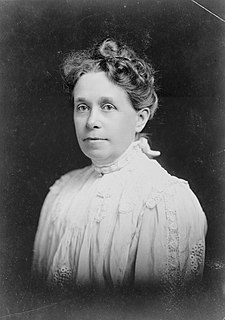
Anna Adams Gordon (1853–1931) was an American social reformer, songwriter, and, as national president of the Woman's Christian Temperance Union when the Eighteenth Amendment was adopted, a major figure in the Temperance movement.

Mary Greenleaf Clement Leavitt was an educator and successful orator who became the first round-the-world missionary for the Woman's Christian Temperance Union (WCTU). Setting out on virtually non-stop worldwide tours over a decade, she "went to all continents save Antarctica," where she crusaded against alcohol and its evils including domestic violence; and advocated for women's suffrage and other equal rights such as higher education for women. In 1891 she became the honorary life president of the World's WCTU.
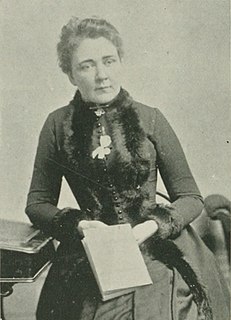
Jessie Ackermann was a social reformer, feminist, journalist, writer and traveller. She was the second round-the-world missionary appointed by the World's Woman's Christian Temperance Union (WWCTU), becoming in 1891 the inaugural president of the federated Australasian Woman's Christian Temperance Union (WCTU), Australia's largest women's reform group. Although an American, Ackermann is considered a major voice in the Australian suffrage movement.

The Temperance movement in the United States is a movement to curb the consumption of alcohol. It had a large influence on American politics and American society in the nineteenth and twentieth centuries, culminating in the unsuccessful prohibition of alcohol, through the Eighteenth Amendment to the United States Constitution, from 1920 to 1933. Today, there are organizations that continue to promote the cause of temperance.
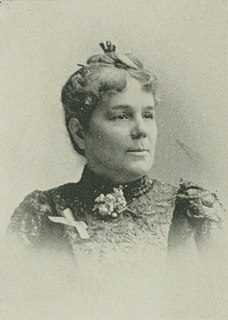
Mary Towne Burt was a 19th-century American temperance reformer, newspaper publisher, and benefactor from Ohio. Burt was identified with temperance work nearly all her life. She was the first president of the Auburn, New York branch of the Women's Christian Temperance Union, and beginning in 1882, served as president of the New York State Society of the Union. In 1875, she became the publisher, and subsequently the editor, of Our Union, the organ of the society, and in 1878–80 was the corresponding secretary of the National Union. For several years, Burt had charge of the legislative interests of the union, and several laws for the protection of women and young girls resulted from her efforts.
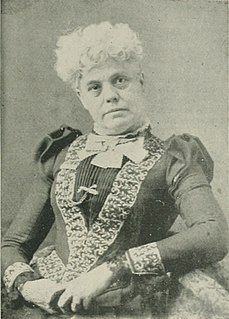
Lepha Eliza Bailey was an American author, lecturer, and social reformer.
The temperance movement in India aims at curbing the use of alcohol in that country. In some places, the temperance movement has led to alcohol prohibition in India, with many temperance organisations continuing their work today.
The Temperance movement began long before the Eighteenth Amendment to the United States Constitution was introduced. Across the country different groups began lobbying for temperance by arguing that alcohol was morally corrupting and hurting families economically, when men would drink their family's money away. This temperance movement paved the way for some women to join the Prohibition movement, which they often felt was necessary due to their personal experiences dealing with drunk husbands and fathers, and because it was one of the few ways for women to enter politics in the era. One of the most notable groups that pushed for Prohibition was the Woman's Christian Temperance Union. On the other end of the spectrum was the Women's Organization for National Prohibition Reform, who were instrumental in getting the 18th Amendment repealed. These women argued that Prohibition was a breach of the rights of American citizens and frankly ineffective due to the prevalence of bootlegging.
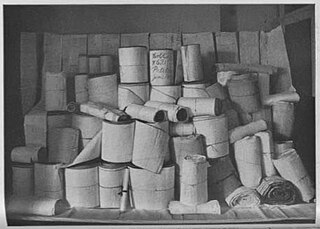
The Polyglot Petition for Home Protection was the first world-wide proclamation against the manufacturing and international trade in liquor and drugs as well as the prohibition of legalised vice. It served as a first major campaign to raise public awareness of the need for international agreements on controls for opium and its derivatives.

Mary Latimer McLendon was an activist in the prohibition and women's suffrage movements in the U.S. state of Georgia.

Women's Christian Temperance Union of New Zealand is a non-partisan, non-denominational, and non-profit organization that is the oldest continuously active national organisation of women in New Zealand. The national organization began in 1885 during the visit to New Zealand by Mary Clement Leavitt, the first world missionary for the Woman's Christian Temperance Union. The WCTU NZ was an early branch of the World Woman's Christian Temperance Union and a founding affiliate of the National Council of Women of New Zealand. Men may join the WCTU NZ as honorary members.
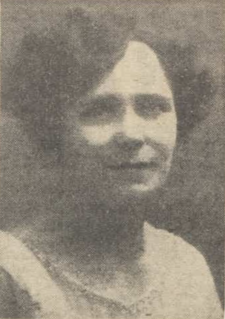
Isabella McCorkindale (1885–1971), known as Isabel, was a Scottish-born Australian temperance, suffrage and women's rights activist. She was a leader in both the Women's Christian Temperance Union of Australasia (WCTUA) and the World Women's Christian Temperance Union (WWCTU). As director of scientific temperance education for the WCTUA, she spent more than 40 years working to educate young people about the health and social consequences of alcohol abuse. She was international president of WWCTU from 1959 to 1962, after serving as vice-president from 1947 to 1959. She then served as national president for the Australian WCTU from 1963 to 1966. In 1961, she was appointed a Member of the Order of the British Empire for her work.
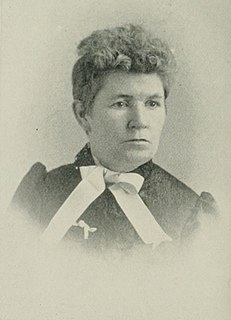
Lucy Robbins Messer Switzer was an American temperance activist. She also established the women's suffrage movement in eastern Washington Territory. Switzer wrote many articles for Pacific Christian Advocate and the Christian Herald, and was a columnist in Cheney, Spokane County, Washington.

The Union Signal is a defunct American newspaper, established in 1883 in Chicago, Illinois. Focused on temperance, it was the organ of the Woman's Christian Temperance Union (WCTU), at one time, the largest women's organization in the United States. Initially, a weekly 16-page illustrated newspaper, it shifted location and publishing schedule before it ceased publication in 2016.


















